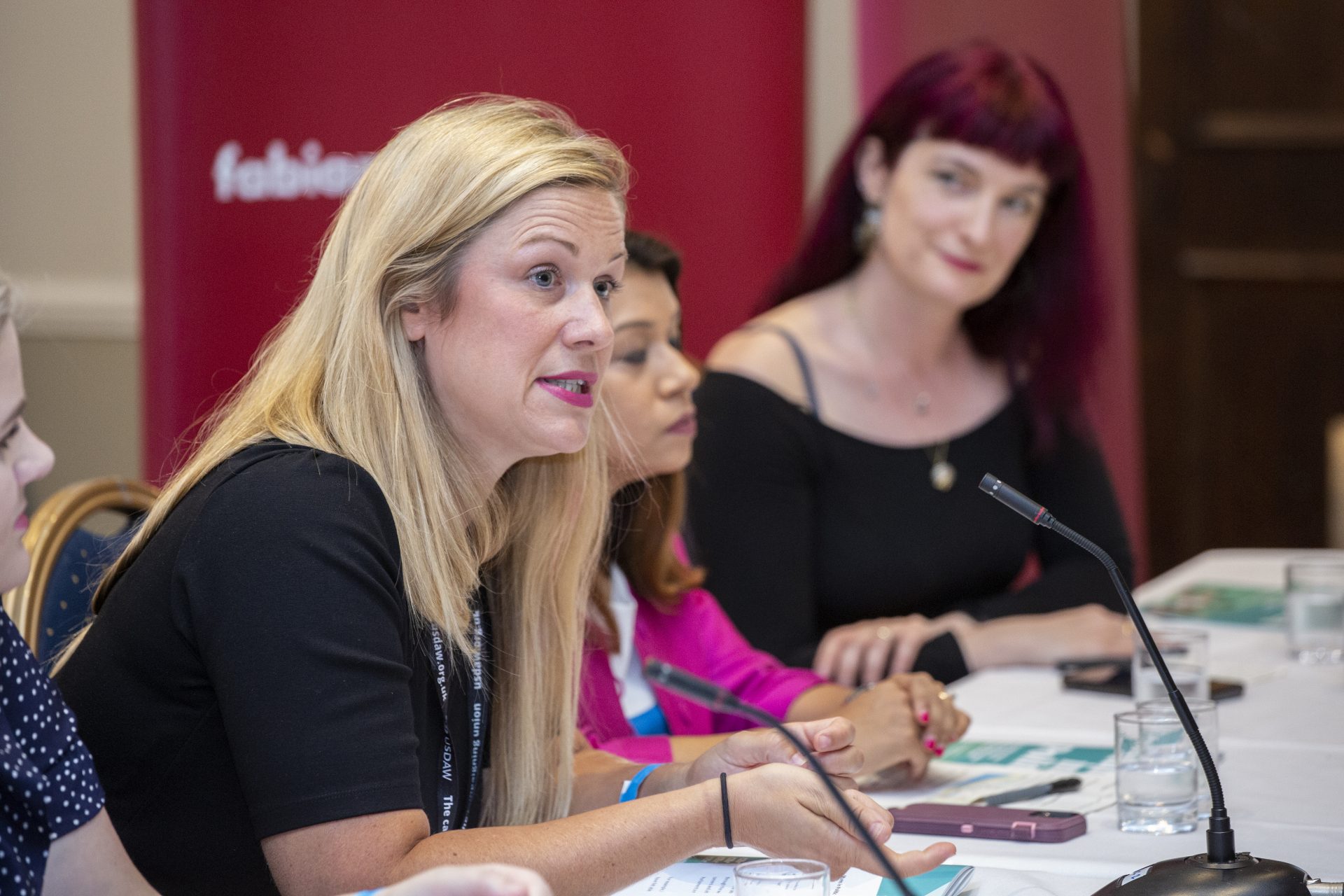Why the proposed Bill Of Rights would be a setback in the fight against male violence

Written by Lauren Geall
As Stylist’s digital writer, Lauren Geall writes on topics including mental health, wellbeing and women’s issues. She’s also a big fan of houseplants and likes to dabble in film and TV from time-to-time. You can find her on Twitter at @laurenjanegeall.
As the British Bill Of Rights heads towards its second reading, the shadow justice minister, Ellie Reeves, tells Stylist why she is opposing the bill.
When the Bill Of Rights was first introduced to parliament back in June, it didn’t take long for concerns to arise. The legislation – which was put forward as a replacement for the landmark Human Rights Act – was initially sold as a bill that would enhance “respect of free speech” and “recognition of the role of a jury trial”, but it soon became clear that the legislation’s scope would be far more wide-reaching.
Fast forward two months, and as the bill approaches its second reading, it’s facing a growing amount of opposition. At the end of last month, the UN wrote a letter to the UK government expressing its concerns, and organisations, politicians and experts alike have spoken up against the proposed legislation, dubbing it the Rights Removal Bill.
One of those people is the shadow justice minister, Ellie Reeves MP, who has spoken out against the bill since it was first introduced. For Reeves, who does a lot of work on ending male violence against women and girls, the changes the proposed Bill Of Rights will make to the UK’s justice system are a major cause for concern.
“Among other things, the Bill Of Rights will weaken the government’s positive obligations – an expectation which currently exists under the Human Rights Act,” she tells Stylist. “At the moment, that means the state has to actively ensure that people’s rights are upheld, rather than just stopping them from being violated in the first place.
“Anecdotally, what we know is that when women report domestic violence or sexual assault, there are circumstances when it’s not taken seriously. But positive obligations under the Human Rights Act mean that the police do have to take these reports seriously, and women have the right to challenge them when they don’t – and that’s important.”
What Reeves is referring to is Article 3 of the European Convention on Human Rights, under which a person has the right not to be subjected to torture or to inhuman or degrading treatment or punishment. This article plays an important role in ensuring the police take reports of sexual violence seriously because it places an obligation on the state to ensure other women aren’t subjected to this kind of “inhuman or degrading treatment” – therefore making it necessary for the police to investigate reports and pursue suspects.
A particular example of this, Reeves points out, was in the case of John Worboys – a taxi driver who is believed to have sexually assaulted over 100 women. Despite two of Worboys’ earliest victims reporting their experiences to the police, Warboys was not charged and went on to assault more women. As a result, those victims took the police to court and were able to hold them responsible thanks to the Human Rights Act.
“That case set a really important precedent that police had to take complaints of sexual violence seriously,” Reeves explains. “And my big worry is that rights like these will simply fall away with the Bill Of Rights.”
But the removal of the government’s positive obligations isn’t the only reason Reeves is concerned about this bill. Indeed, Reeves explains, the bill will also make it harder for people to bring human rights cases to court – therefore making it more difficult for women to use the Human Rights Act to challenge the state’s failures to protect them.
“Under the Bill Of Rights you’ll only get permission to pursue justice if you can show that you’ve suffered a ‘significant disadvantage’, the definition of which has not yet been made clear,” Reeves explains. “This seems like more than merely weeding out the very trivial claims – it’s a high threshold and will make it harder for people to pursue their rights.”
In light of the huge waiting times the court system is already facing, Reeves says the introduction of a ‘permission’ stage will also have a “chilling” effect on the number of people who feel confident to use the justice system to assert their rights.
However, the Ministry of Justice is keen to stress that stopping people from asserting their rights is not the aim of this policy – instead, it aims to stop ‘trivial’ claims from wasting court time and public resources.
“Nothing in the Bill of Rights will prevent serious cases [such as rape] from being brought in the future,” a spokesperson for the Ministry of Justice told Stylist. “The permission stage for human rights claims is intended to filter out trivial ones to stop the waste of taxpayers’ money and valuable court time and won’t apply at all to criminal cases.”
For Reeves, however, the reasoning behind the Bill Of Rights’ introduction makes little difference to her opposition. “This bill is completely the wrong priority for the government right now, especially when it comes to violence against women and girls,” she says. “Rape prosecutions are at record low levels and 40% of victims are pulling out of their cases before they even get to court because they’ve lost confidence in the system and have to wait so long.
“If the government really cares about tackling violence against women and girls, they should be putting their energy into fixing the broken system rather than ripping up the Human Rights Act, which is going to set us back in terms of tackling violence against women and girls rather than forward. This bill doesn’t tackle any of the very real issues facing us in society.”
Reeves is not alone in her concerns. Responding to the bill when it was first announced, Andrea Simon, director of the End Violence Against Women coalition, described the bill as “yet another attack on our society”.
“The new Bill of Rights proposals interfere with some of the most fundamental legal protections that victims have relied on to hold the state to account when they fail in their duties to prevent violence against women,” she said.
“There is no reasonable justification for seeking to curb obligations on public authorities to protect people’s human rights; this move simply seeks to absolve the state of responsibility in this area and will drastically impact victims and survivors of abuse.”
At a time when the issue of male violence against women and girls feels more pressing than ever, it’s vital that the rights of victims and survivors are protected and strengthened.
If the government really is committed to providing women and girls with the sense of safety we desperately need, it’s time to start tackling the issue at its core – not making legislative amendments that have the potential to make things worse.
Images: Getty
Source: Read Full Article
